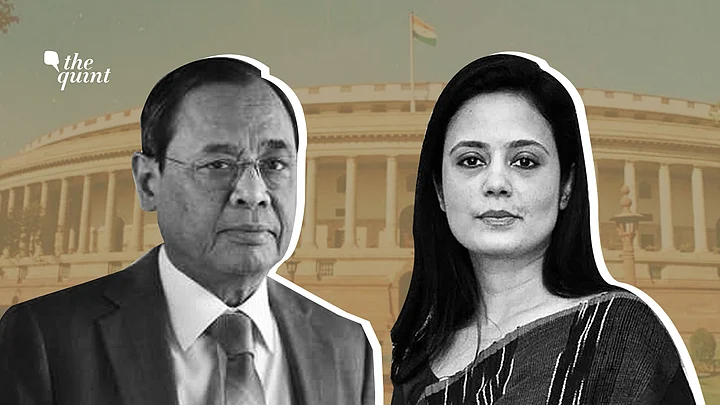Trinamool Congress MP Mahua Moitra’s fiery 20-minute speech in Parliament during the Motion of Thanks on 8 February is the talk of the town – with her remarks over allegations of sexual harassment against former Chief Justice of India (CJI) Ranjan Gogoi, at the center of the storm.
Without naming the former CJI, Moitra said:
“The sacred cow that was the judiciary is no longer sacred. It stopped being sacred the day a sitting chief justice of this country was accused of sexual harassment, presided over his own trial, cleared himself and then proceeded to accept a nomination to the Upper House within three months of retirement, complete with Z-plus security cover.”
Although Moitra did not name Gogoi, the Lok Sabha witnessed an uproar from MPs on the treasury benches, who vehemently opposed her remarks.
She was allowed to finish her speech though – which slammed the ruling government on everything, from the farmers’ protest to misuse of the Sedition law – with a caveat that her remarks on the former CJI would be expunged if they were found to be objectionable.
A day later, it was reported that the Centre had decided to not take any action against the Krishnanagar MP for her speech.
But did she really make claims that were not factual, that could warrant action?
The Allegations Against Gogoi
A 35-year-old woman had accused Gogoi of sexual harassment in April 2019. The former junior court assistant submitted an affidavit to 22 judges of the Supreme Court outlining how the then CJI had sexually harassed her, and how she was further victimised and dismissed from her post.
The apex court took suo moto cognizance of the allegations but had then followed it up with the creation of a special bench, headed by the accused (also the CJI) himself.
Gogoi called it a “conspiracy to malign” him, adding that he did not “deem it appropriate” to reply to the allegations.
A month later, in May 2019, a three-judge in-house Supreme Court inquiry panel, headed by now CJI SA Bobde, dismissed the complaint of sexual harassment against Gogoi.
On 19 March 2020, he took oath of office as a Member of Parliament in Rajya Sabha, as the Opposition staged a walkout.
‘Shameful to Bring Up the Allegations’: Union Minister
Moitra’s mention of the ‘former CJI’ saw many BJP MPs strongly oppose her remarks.
The loudest among them was Union Minister Arjun Ram Meghwal and BJP MP Nishikant Dubey who got up and “objected” to the former CJI’s sexual harassment case being discussed in the House.
Meghwal even went on to say that Moitra’s comments against the former CJI were “shameful.”
To break it down, a sitting minister said that discussing sexual harassment allegations (that was levelled on record) was ‘shameful’. The allegation raised by Moitra and not the alleged act was referred to as ‘shameful.’
From Banker to Parliamentarian, to Winning the Internet
Moitra’s journey from vice president of JP Morgan to spokesperson, and MP from the Trinamool Congress has often been written about.
Moitra quit her banking job in London in 2008 to come back to India and join politics. She first ventured into the Congress and then joined the Trinamool Congress in early 2010.
In 2016, she won her first election for the party from the Karimpur constituency in the West Bengal Assembly Elections, and was sent to the Parliament from Krishnanagar in 2019.
She has also been winning the internet since her very first speech in Parliament in 2019. The parliamentarian was not only highly critical of the BJP but also drew attention to seven indicators that show “there is a danger of fascism rising in India.”
In yet another viral speech on the floor of the House in 2019, Moitra took on the UAPA Bill. She said:
“Why are we in the Opposition always at the risk of being called anti-national when we disagree with this government on issues of national security, law & order or policing? Every time we disagree with this government, its troll armies, its propaganda machine works overtime to call us terrorist sympathisers, to call us ‘sickular, to call us ‘anti-national’?”
(At The Quint, we question everything. Play an active role in shaping our journalism by becoming a member today.)
